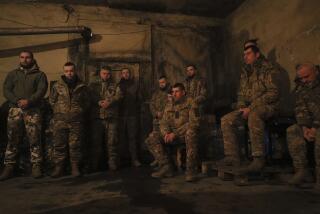U.N. Military Action in Bosnia Urged in U.S. Senate Report
- Share via
WASHINGTON — With diplomacy proving woefully inadequate, the only hope for ending the fighting in Bosnia-Herzegovina and preventing a wider Balkan war seems to be large-scale military intervention by the United Nations, a Senate Foreign Relations Committee staff report said Wednesday.
Although it conceded that no U.N. member country has yet shown any willingness to put its own forces at risk to stop the slaughter, the report said that peaceful steps--including some that might have worked if they had been tried earlier--now hold no real promise.
“The available non-military actions are at best pathetic when measured against the scope of the tragedy and the determination of the Serbs,” the report said.
Sen. Claiborne Pell (D-R.I.), the committee chairman, said that the failure of the international community to prevent Serbian militias from dismembering Bosnia and slaughtering its Muslim population already has encouraged the Serbs to extend their brutal policy of “ethnic cleansing” to Kosovo province and other parts of the former Yugoslav federation.
That expansion substantially increases the risk that the conflict may boil over into other Balkan countries like Albania, Bulgaria, Greece and Turkey. “It also signals to other potential aggressors worldwide that force can prevail,” Pell added.
The report seems certain to increase the pressure on both the Bush Administration and the incoming government of President-elect Bill Clinton to support the use of military force against the Serbian regime of President Slobodan Milosevic and its allies among ethnic Serbs in the other republics. While the brutality of the war in Bosnia has been well documented, the report underlines the danger that the conflict could widen into the sort of Balkan war that sparked World War I.
“Without substantial military force, there is every reason to be pessimistic about the prospects of sufficient aid reaching Bosnia’s besieged population this winter,” the report said. “Stopping the slaughter of the Bosnian Muslims and the destruction of the Bosnian state may require large-scale military intervention which no state is presently willing to contemplate.”
In a related action, representatives of 10 Balkan countries meeting in Istanbul, Turkey, called for U.N. intervention to prevent Serbian forces from overrunning the Bosnian capital of Sarajevo.
“Sarajevo must be saved at all costs,” said Turkish Foreign Minister Hikmet Cetin, summing up a joint declaration by Italy, Austria, Hungary, Albania, Bulgaria, Romania, Slovenia, Croatia, Macedonia and Turkey. “If Sarajevo is allowed to fall, this will send shock waves through the Balkans and through entire Europe,” Cetin said.
Like the Senate report, the declaration by the Balkan states warned that the fighting could easily spread from Bosnia into the ethnic tinderboxes of Kosovo and Macedonia. Kosovo is a province of Serbia, but its population is 90% ethnic Albanians. Macedonia, a former republic of Yugoslavia, is an ethnic checkerboard like Bosnia.
“The spread of the conflict would lead to unforeseeable consequences and would have to be stopped by most resolute actions of the international community,” the joint declaration said.
In Washington, a senior Administration official said the U.S. government is conferring with its allies about proposals to send substantial numbers of international civilian observers to Kosovo to attempt to prevent the outbreak of fighting there. But the official refused to confirm a New York Times report that President Bush has proposed creation of such a force in letters to the leaders of France and Britain.
At present, there are four observers representing the Conference on Security and Cooperation in Europe stationed in Kosovo. Critics say the number is too small to do any good, although State Department spokesman Joe Snyder said the area has been calm since the observers arrived.
In a new demonstration of the intractability of the conflict, a Serbian militia commander blocked a U.N. relief convoy bound for the besieged town of Srebrenica in eastern Bosnia on Wednesday. Another convoy, headed for Gorazde, was stalled when an armored escort vehicle hit a mine.
“This is an extremely serious development,” said Jose Maria Mendiluce, special envoy of the Office of the U.N. High Commissioner for Refugees. “Just four days ago, we received assurances from (Bosnian Serb leader) Radovan Karadzic that our convoy could go through.”
The Senate committee report said the failure to stop the fighting in Bosnia “undermines the authority of the United Nations and with it the global collective security regime.”
“So far, no international action has had the slightest deterrent effect on Milosevic and his Bosnian Serb surrogates, who seem to respond only to the threat of force,” the report said.
Like the majority of the victims in Bosnia, the ethnic Albanian residents of Kosovo are mostly Muslims. Most Serbs are Orthodox Christians. Although some Muslim countries like Saudi Arabia, Egypt and Iran have emphasized the religious elements of the conflict, the United States and most European countries have tried to minimize that aspect.
Turkey, a predominantly Muslim country with a secular government, has tried to downplay the religious differences between the combatants.
Ozdem Sanberk, undersecretary of the Turkish Foreign Ministry, said the Istanbul meeting was important because it attracted representatives from both Christian and Muslim countries in the Balkans.
Special correspondent Hugh Pope in Istanbul, Turkey, contributed to this report.
More to Read
Sign up for Essential California
The most important California stories and recommendations in your inbox every morning.
You may occasionally receive promotional content from the Los Angeles Times.










